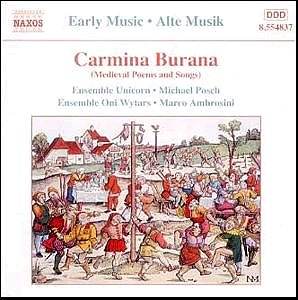To the casual listener, Carmina Burana is
a big splashy choral and orchestral work that has made it into
more B action films that can be counted. Carl Orffís decided masterwork
has been sadly relegated to Hollywood status, and poorly imitated
by countless hack film scorers. Herr Orff got his texts, however,
from a manuscript of songs and poems, probably compiled around
1230, and written down by at least three different scribes in
monasteries either in Styria or Carinthia. In 1803, the manuscript
was taken from its home at the Abbey of Benediktbeuren
to Munich, where in 1847 it was edited and published under its
now famous title.
Although there is some musical notation in the
original manuscript, it is in the form of heightened neumes, vague
indications of pitch and melodic flow, and as such, it is impossible
to determine the exact tunes to which these poems, which are often
rather bawdy in nature, were sung. Since, however, it was the
common practice of Medieval musicians to adapt a single tune to
fit any number of texts, (a practice known as contrafactum)
these works can rather easily and with a fair sense of authenticity
be brought to life. This is achieved through the more clearly
notated melodies left behind by, among others, the St. Martial
composers active in Limoges during the period, and of those who
were working at Notre Dame.
The end result is a collection of magnificent
music, lively and rhythmic, tuneful and engaging with some of
the most wonderful poetry ever penned for its texts. The two exemplary
ensembles heard in this recording are breathtakingly flawless.
They completely and utterly revel in this spirited repertoire
and exhibit sheer joy in bringing it to life.
Of particular note here, (although there is absolutely
nothing negative to say about the work of any of these musicians)
are our two solo singers, countertenor Bernhard Landauer, and
tenor Eric Mentzel. Mr. Landauer is absolutely the very finest
countertenor I have ever heard. His voice is perfectly seamless;
every note of his range from lowest to highest is of the ideal
weight and timbre. His flawless rendition of Axe Phebus aureo,is
a tour de force of musical story telling, delightful in its contrasts
and scene painting. Mr. Mentzel also acquits himself marvelously
in his several duets with Landauer. It is a bit of a shame that
he gets no solos here, as his is a lovely and mellifluous instrument,
which blends perfectly with his singing partnerís.
All of the tunes in this performance are infectious
due in large part to their lilting rhythms. One would be hard
pressed however to leave the room whistling them simply because
they are such uncommon and unusual fare. One outstanding work
however, Katharina collaudemus will instantly bring to
mind the plainchant hymn Pange lingua for those who are
familiar with the Roman and Anglican music traditions.
Lest I forget the instrumentalists, who on the
whole all double as choristers where needed, let me be quick to
point out their notable virtuosity and magnificent abilities at
improvisation. Everything is played with a life and energy that
left me dancing around the room by discís end.
Sound quality is exquisite; Keith Anderson has
translated a set of notes program notes by Michael Posch that
are concise, informative and relevant. A complete winner, this!
Recommended without a momentís hesitation.
Kevin Sutton

